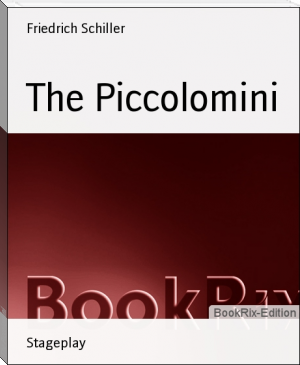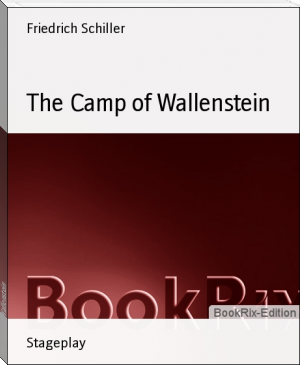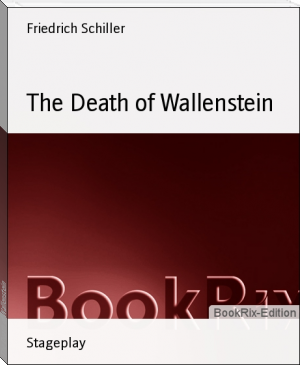The Piccolomini by Friedrich Schiller (summer reads TXT) 📖

- Author: Friedrich Schiller
Book online «The Piccolomini by Friedrich Schiller (summer reads TXT) 📖». Author Friedrich Schiller
"Upon the whole there can be no doubt that this trilogy forms, in its original tongue, one of the most splendid specimens of tragic art the world has witnessed; and none at all, that the execution of the version from which we have quoted so largely, places Mr. Coleridge in the very first rank of poetical translators. He is, perhaps, the solitary example of a man of very great original genius submitting to all the labors, and reaping all the honors of this species of literary exertion."
--Blackwood, 1823.
PREFACE.
The two dramas,--PICCOLOMINI, or the first part of WALLENSTEIN, and the DEATH OF WALLENSTEIN, are introduced in the original manuscript by a prelude in one act, entitled WALLENSTEIN'S CAMP. This is written in rhyme, and in nine-syllable verse, in the same lilting metre (if that expression may be permitted), with the second Eclogue of Spenser's Shepherd's Calendar.
This prelude possesses a sort of broad humor, and is not deficient in character: but to have translated it into prose, or into any other metre than that of the original, would have given a false idea both of its style and purport; to have translated it into the same metre would have been incompatible with a faithful adherence to the sense of the German from the comparative poverty of our language in rhymes; and it would have been unadvisable, from the incongruity of those lax verses with the present taste of the English public. Schiller's intention seems to have been merely to have prepared his reader for the tragedies by a lively picture of laxity of discipline and the mutinous dispositions of Wallenstein's soldiery. It is not necessary as a preliminary explanation. For these reasons it has been thought expedient not to translate it.
The admirers of Schiller, who have abstracted their idea of that author from the Robbers, and the Cabal and Love, plays in which the main interest is produced by the excitement of curiosity, and in which the curiosity is excited by terrible and extraordinary incident, will not have perused without some portion of disappointment the dramas, which it has been my employment to translate. They should, however, reflect that these are historical dramas taken from a popular German history; that we must, therefore, judge of them in some measure with the feelings of Germans; or, by analogy, with the interest excited in us by similar dramas in our own language. Few, I trust, would be rash or ignorant enough to compare Schiller with Shakspeare; yet, merely as illustration, I would say that we should proceed to the perusal of Wallenstein, not from Lear or Othello, but from Richard II., or the three parts of Henry VI. We scarcely expect rapidity in an historical drama; and many prolix speeches are pardoned from characters whose names and actions have formed the most amusing tales of our early life. On the other hand, there exist in these plays more individual beauties, more passages whose excellence will bear reflection than in the former productions of Schiller. The description of the Astrological Tower, and the reflections of the Young Lover, which follow it, form in the original a fine poem; and my translation must have been wretched indeed if it can have wholly overclouded the beauties of the scene in the first act of the first play between Questenberg, Max, and Octavio Piccolomini. If we except the scene of the setting sun in the Robbers, I know of no part in Schiller's plays which equals the first scene of the fifth act of the concluding plays. [In this edition, scene iii., act v.] It would be unbecoming in me to be more diffuse on this subject. A translator stands connected with the original author by a certain law of subordination which makes it more decorous to point out excellences than defects; indeed, he is not likely to be a fair judge of either. The pleasure or disgust from his own labor will mingle with the feelings that arise from an afterview of the original. Even in the first perusal of a work in any foreign language which we understand, we are apt to attribute to it more excellence than it really possesses from our own pleasurable sense of difficulty overcome without effort. Translation of poetry into poetry is difficult, because the translator must give a brilliancy to his language without that warmth of original conception from which such brilliancy would follow of its own accord. But the translator of a living author is incumbered with additional inconveniences. If he render his original faithfully as to the sense of each passage, he must necessarily destroy a considerable portion of the spirit; if he endeavor to give a work executed according to laws of compensation he subjects himself to imputations of vanity or misrepresentation. I have thought it my duty to remain bound by the sense of my original with as few exceptions as the nature of the languages rendered possible.
S. T. C.
WALLENSTEIN, Duke of Friedland, Generalissimo of the Imperial Forces in the Thirty Years' War.
OCTAVIO PICCOLOMINI, Lieutenant-General.
MAX. PICCOLOMINI, his Son, Colonel of a Regiment of Cuirassiers.
COUNT TERZKY, the Commander of several Regiments, and Brother-in-law of Wallenstein.
ILLO, Field-Marshal, Wallenstein's Confidant.
ISOLANI, General of the Croats.
BUTLER, an Irishman, Commander of a Regiment of Dragoons.
TIEFENBACH, |
DON MARADAS, | Generals under Wallenstein.
GOETZ, |
KOLATTO, |
NEUMANN, Captain of Cavalry, Aide-de-Camp to Terzky.
VON QUESTENBERG, the War Commissioner, Imperial Envoy.
BAPTISTA SENI, an Astrologer.
DUCHESS OF FRIEDLAND, Wife of Wallenstein.
THEKLA, her Daughter, Princess of Friedland.
THE COUNTESS TERZRY, Sister of the Duchess.
A CORNET.
COLONELS and GENERALS (several).
PAGES and ATTENDANTS belonging to Wallenstein.
ATTENDANTS and HOBOISTS belonging to Terzky.
MASTER OF THE CELLAR to Count Terzky.
VALET DE CHAMBRE of Count Piccolomini.
ACT I.
SCENE I.
An old Gothic Chamber in the Council-House at Pilsen,
decorated with Colors and other War Insignia.
ILLO, with BUTLER and ISOLANI.
ILLO. Ye have come too late-but ye are come! The distance, Count Isolani, excuses your delay.
ISOLANI. Add this too, that we come not empty-handed. At Donauwerth [1] it was reported to us, A Swedish caravan was on its way, Transporting a rich cargo of provision, Almost six hundreds wagons. This my Croats Plunged down upon and seized, this weighty prize!-- We bring it hither----
ILLO.
Just in time to banquet The illustrious company assembled here.
BUTLER. 'Tis all alive! a stirring scene here!
ISOLANI.
Ay! The very churches are full of soldiers.
[Casts his eye round. And in the council-house, too, I observe, You're settled quite at home! Well, well! we soldiers Must shift and suit us in what way we can.
ILLO. We have the colonels here of thirty regiments. You'll find Count Terzky here, and Tiefenbach, Kolatto, Goetz, Maradas, Hinnersam, The Piccolomini, both son and father-- You'll meet with many an unexpected greeting From many an old friend and acquaintance. Only Gallas is wanting still, and Altringer.
BUTLER. Expect not Gallas.
ILLO (hesitating).
How so? Do you know----
ISOLANI (interrupting him). Max. Piccolomini here? O bring me to him. I see him yet ('tis now ten years ago, We were engaged with Mansfeldt hard by Dessau), I see the youth, in my mind's eye I see him, Leap his black war-horse from the bridge adown, And t'ward his father, then in extreme peril, Beat up against the strong tide of the Elbe. The down was scarce upon his chin! I hear He has made good the promise of his youth, And the full hero now is finished in him.
ILLO. You'll see him yet ere evening. He conducts The Duchess Friedland hither, and the princess [2] From Caernthen [3]. We expect them here at noon.
BUTLER. Both wife and daughter does the duke call hither? He crowds in visitants from all sides.
ISOLANI.
Hm! So much the better! I had framed my mind To hear of naught but warlike circumstance, Of marches and attacks, and batteries; And lo! the duke provides, and something too Of gentler sort and lovely, should be present To feast our eyes.
ILLO (who has been standing in the attitude of meditation, to BUTLER,
whom he leads a little on one side).
And how came you to know That the Count Gallas joins us not?
BUTLER.
Because He importuned me to remain behind.
ILLO (with warmth). And you? You hold out firmly!
[Grasping his hand with affection.
Noble Butler!
BUTLER. After the obligation which the duke Had laid so newly on me----
ILLO.
I had forgotten A pleasant duty--major-general, I wish you joy!
ISOLANI.
What, you mean, of this regiment? I hear, too, that to make the gift still sweeter, The duke has given him the very same In which he first saw service, and since then Worked himself step by step, through each preferment, From the ranks upwards. And verily, it gives A precedent of hope, a spur of action To the whole corps, if once in their remembrance An old deserving soldier makes his way.
BUTLER. I am perplexed and doubtful whether or no I dare accept this your congratulation. The emperor has not yet confirmed the appointment.
ISOLANI. Seize it, friend, seize it! The hand which in that post Placed you is strong enough to keep you there, Spite of the emperor and his ministers!
ILLO. Ay, if we would but so consider it!-- If we would all of us consider it so! The emperor gives us nothing; from the duke Comes all--whate'er we hope, whate'er we have.
ISOLANI (to ILLO). My noble brother! did I tell you how The duke will satisfy my creditors? Will be himself my bankers for the future, Make me once more a creditable man! And this is now the third time, think of that! This kingly-minded man has rescued me From absolute ruin and restored my honor.
ILLO. Oh that his power but kept pace with his wishes! Why, friend! he'd give the whole world to his soldiers. But at Vienna, brother!--here's the grievance,-- What politic schemes do they not lay to shorten His arm, and where they can to clip his pinions. Then these new dainty requisitions!
 In literature a drama genre deserves your attention. Dramas are usually called plays. Every person is made up of two parts: good and evil. Due to life circumstances, the human reveals one or another side of his nature. In drama we can see the full range of emotions : it can be love, jealousy, hatred, fear, etc. The best drama books are full of dialogue. This type of drama is one of the oldest forms of storytelling and has existed almost since the beginning of humanity. Drama genre - these are events that involve a lot of people. People most often suffer in this genre, because they are selfish. People always think to themselves first, they want have a benefit.
In literature a drama genre deserves your attention. Dramas are usually called plays. Every person is made up of two parts: good and evil. Due to life circumstances, the human reveals one or another side of his nature. In drama we can see the full range of emotions : it can be love, jealousy, hatred, fear, etc. The best drama books are full of dialogue. This type of drama is one of the oldest forms of storytelling and has existed almost since the beginning of humanity. Drama genre - these are events that involve a lot of people. People most often suffer in this genre, because they are selfish. People always think to themselves first, they want have a benefit.




Comments (0)